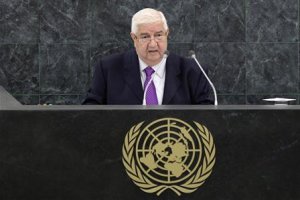
Syrian Foreign Minister Walid al-Moualem addresses the 68th session of the United Nations General Assembly …
UNITED NATIONS (Reuters) - Syria's foreign minister on Monday compared what he described as an invasion of foreign terrorists across his country to the September 11, 2001, attacks on the United States, remarks that Washington dismissed as offensive and disingenuous.
In a speech to the annual meeting of the U.N. General Assembly in New York, Syrian Foreign Minister Walid al-Moualem also said that "terrorists from more than 83 countries are engaged in the killing of our people and our army" under the appeal of global jihad.
"There is no civil war in Syria, but it is a war against terror that recognizes no values, nor justice, nor equality, and disregards any rights or laws," Moualem said.
The United Nations says more than 100,000 people have been killed in Syria's 2-1/2 year conflict as rebels fight against the forces of President Bashar al-Assad's government. It began in March 2011 when the government tried to crush pro-democracy protests and eventually became a full-scale war. Now more than half of Syria's 20 million people need aid.
"The people of New York have witnessed the devastations of terrorism, and were burned with the fire of extremism and bloodshed, the same way we are suffering now in Syria," Moualem said, referring to the September 11 attacks carried out by the al Qaeda network that brought down the World Trade Center in New York and damaged the Pentagon outside Washington.
"How can some countries, hit by the same terrorism we are suffering now in Syria, claim to fight terrorism in all parts of the world while supporting it in my country?" he said.
The U.S. mission to the United Nations responded by saying Moualem's comment was "as disingenuous as it is offensive," adding that his statements "have no credibility."
"The fact that the Syrian regime has shelled schools and hospitals and used chemical weapons on its own people demonstrates that it has adopted the very terrorist tactics that it today decried," U.S. mission spokeswoman Erin Pelton said.
Assad's government accuses Turkey, Saudi Arabia, Qatar, Britain, France and the United States of arming, financing and training rebel forces in Syria.
The opposition Syrian Coalition described Moualem's U.N. speech as misleading. "The extremists and terrorists do not represent the opposition," the coalition said in a statement.
"The terrorists are doing the regime's work - they frighten local populations, directly and actively attack moderate leaders, and drive sectarian wedges to scare off efforts to support the moderates," it said.
Last week the U.N. Security Council achieved a rare moment of unity on the Syrian war by passing a resolution demanding the elimination of Syria's chemical arsenal by mid-2014. Assad's ally Russia supported the resolution, which was based on a U.S.-Russian plan agreed upon in Geneva.
HUMANITARIAN CRISIS
The council is now turning its attention to Syria's dire humanitarian crisis, putting to the test its fragile consensus on the conflict with plans to approve a statement by Thursday aimed at boosting aid access in Syria.
"The signs are good," Australian U.N. Ambassador Gary Quinlan, serving as president of the Security Council for September, said after the council met to discuss the statement drafted by Australia and Luxembourg.
Quinlan said that "we don't want to lose the momentum and good spirit," and said a decision has been made to pursue a non-binding statement on the issue because negotiating a legally binding resolution would take more time.
In another development, Foreign Minister Sergei Lavrov said in comments published on Monday that Russia wants to revive plans for a conference on ridding the Middle East of weapons of mass destruction now that Syria has pledged to abandon its chemical arms.
Despite the deal on Syria's chemical arms, fighting with conventional weapons still rages. A mortar shell hit the Chinese embassy in Syria's capital Damascus on Monday, damaging the building and wounding one person, Chinese state media reported.
U.N. chemical weapons inspectors investigating allegations of chemical and biological weapons use in Syria left Damascus on Monday after their second mission in two months, witnesses said.
Another team of U.N. experts, charged with starting the process of verifying and eliminating Syria's chemical weapons, landed in Beirut on Monday. About 20 of them arrived on a private flight from the Netherlands, a source at Beirut airport said, and are expected to continue on to Damascus this week.
Moualem said the Syrian government is committed to fulfilling its obligations after having acceded to the Chemical Weapons Convention that bans the use of such weapons. But he repeated the government's position that it is the rebels who have been using poison gas, not forces loyal to Assad.
"Terrorists, who used poisonous gases in my country, have received chemical agents from regional and Western countries that are well known to all of us," he said.
The United Nations has received reports of at least 14 chemical weapons attacks in Syria. The most recent was an August 21 sarin gas attack in a Damascus suburb that the United States says killed more than 1,400 people, many of them children.
The United States and its allies blame Assad's government for the attack, while the government blames the rebels.
(Additional reporting by Michelle Nichols at the United Nations, Steve Gutterman in Moscow, Fredrik Dahl in Vienna, Sui-Lee Wee in Beijing, and Alexander Dziadosz and Stephen Kalin in Beirut; Editing by Will Dunham)

No comments:
Post a Comment